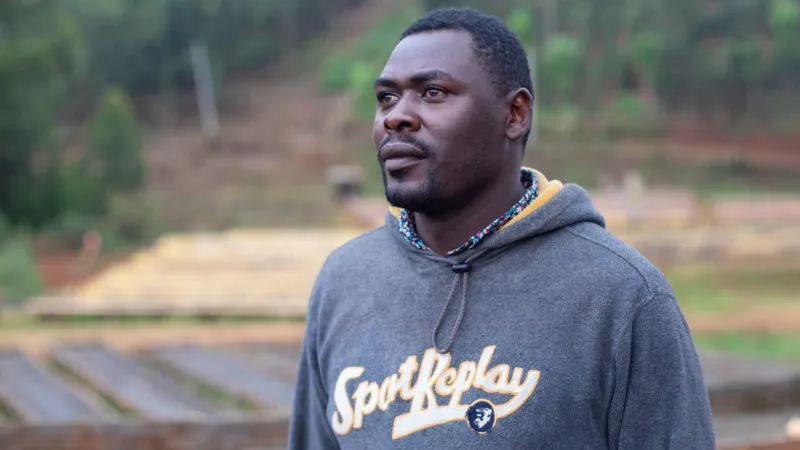In the lush, volcanic highlands of Komothai in central Kenya, farmers like Simon Macharia produce coffee on small plantations scattered across the hillsides.
Along with other farmers, Mr Macharia brings sacks of his bright red coffee cherries to the local processing plant, where they are weighed and treated.
A machine removes the red husks, and the pale beans inside are washed and passed along concrete channels, ending up on lines of drying platforms that sweep across the valley.
Here, workers categorise the beans into grades, the highest destined for the coffee houses of Europe.
“We call coffee the black gold around here,” Mr Macharia, whose farm covers 2.5 hectares (six acres) , told the BBC.
He grows the Kenya AA coffee beans, which are prized worldwide for their high quality, full body, deep aromas and fruity flavour.

The crop has been part of these lush highlands since the late 1890s, when British colonial settlers introduced it.
Now, the area is famous for its unique, top-rated coffee.
Growing the berries is labour intensive – picking, pruning, weeding, spraying, fertilising and transporting the products.
“Coffee requires your full-time concentration, especially when it starts to bloom,” Mr Macharia said.
“From that moment up until the day that you are going to harvest – those six months, your full-time job is on the farm.”
A coffee tree is a huge investment for cash-strapped farmers, as it can take four years for the fruits to mature.
The price of a single cup of coffee in a chic European café, typically $4 (£3.20), highlights a stark disparity when compared to the earnings of many Kenyan coffee labourers, who make at most $2.30 a day.
Edita Mwangi, who harvests coffee cherries on the red earth hillside overlooking the processing plant, confirms this.
“They don’t know the poverty we suffer. You have to struggle day and night just to survive,” she said.
With four children depending on her, Ms Mwangi works six days a week, earning about $1.40 a day.
She has to walk 5km (three miles) to reach the farm where she works.

Farmers feel the trading system between Kenya and Europe – the world’s largest coffee market – has been stacked against them for many years.
But now, a new threat looms, jeopardising farmers’ ability to make a living – climate change.
Coffee trees are extremely sensitive to small differences in temperature and weather conditions.
They also need specific climatic conditions like humid temperatures and ample rainfall to grow.
“Climate change is a major challenge for our coffee farmers,” says John Murigi, the chairman of the Komothai Coffee Society, which represents 8,000 coffee farmers like Mr Macharia.
Cold temperatures and erratic rainfall are having a devastating impact on the delicate coffee plants, said Mr Murigi.
As a result, “coffee production has decreased over the last few years”.
He added that climate change was intensifying the spread of diseases in coffee plants.
Mr Murigi said there had been a significant increase in coffee leaf miners, bugs that feed on coffee leaves, and coffee berry disease, a destructive fungal infection that can wipe out more than 80% of crops.
To deal with the increasing outbreaks, farmers are resorting to using herbicides and insecticides that can damage soil quality in the long term and also pose health risks.

To produce a single cup of coffee can require up to 140 litres of water – including the water to grow the plants.
But higher temperatures and changing rainfall patterns mean a decreasing water supply for coffee farmers in Kiambu County.
Farmer Joseph Kimani told the BBC that the “river levels have gone down a lot” due to erratic weather, such as periods of drought and heavy rains.
He said that because of the lack of rain, farmers are forced to use more river water.
But this increased reliance on river water, driven by the lack of rainfall, may be further straining the already limited water supply.
While Mr Murigi acknowledges the rise in water use by coffee farmers, he denies this is why the river is drying up.
However, with 23 coffee societies in this region, a significant amount of water is clearly being used in the coffee growing process in Kiambu County.
Komothia’s story is not unique. As global temperatures and droughts increase, good coffee will become difficult to grow in all parts of the world.

Coffee can only be grown in the “coffee belt” – tropical regions around the world in areas typically located at an altitude of between 1,000m and 2,000m.
In recent years, climate change has led to a shortage of global coffee supplies and an increase in the price of coffee due to drought and crop failures in several key coffee-producing nations such as Brazil and Vietnam.
A survey by Fairtrade International, the organisation behind Fairtrade labels, found that 93% of Kenyan coffee farmers are already experiencing the effects of climate change.
The coffee industry in Kenya is a key source of employment, providing jobs for an estimated 150,000 people.
To protect the industry, coffee farmers in areas like Komothai are experimenting with climate adaptation techniques, such as planting trees to provide extra shade for the coffee plants.
Mr Murigi said it is only through addressing both the climate and economic challenges faced by Kenyan coffee farmers that they can have a sustainable future.
However, coffee farmers like Mr Macharia are pessimistic about the industry’s future.
“Right now, as things stand, I don’t think any parent wants their child here farming coffee,” he said.
Update 2 January 2025: We have removed a reference to glyphosates causing cancer from this article because the evidence remains unclear.














